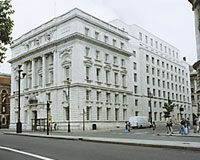
What does the appointment of Theresa May to the post of prime minister mean for real estate? The truth is, not much. The real estate that is most immediately implicated is Downing Street, where both David Cameron’s and George Osborne’s flats are getting new residents. But other than that, anyone who tells you that May’s ascent means anything more specific for the industry is just making it up. She has more important things on her mind.
Even in normal times, when prime ministers have only to worry about the health of the economy, foreign policy, defence and national security, reform of public services, infrastructure, pensions and benefits, there’s not a lot of time to be thinking about anything else.
And what little time there is to think about property issues will usually be absorbed by housing policy, possibly with a side order of rescuing failing high streets. But in these extraordinary times, she is very likely to leave her cabinet ministers to it.
And the only minister who really matters here is the new chancellor, Philip Hammond. While Greg Clark and Sajid Javid’s job swap between the Department for Communities and Local Government and the recast Department for Business, Energy and Industrial Strategy is moderately interesting, Hammond will set the pace. This is partly because any reshuffle of government ministers causes the civil service to hit the pause button for three to six months while the new minister works out how to approach their new responsibilities.
But Hammond already knows what he thinks when it comes to property issues, because he has personal experience of the industry. Even while defence secretary and foreign secretary, he intervened privately in debates about housing and planning policy within government, and now he is chancellor he will have much more licence to do so.
He also has the weight of the Treasury behind him, which frets permanently over the state of Britain’s land and property markets. One of the reasons No 10 need not get involved in real estate issues is because the Treasury is often preoccupied with them.
The leading argument will be that if the UK leaves the EU, structural reform of land and property markets to secure greater productivity and efficiency will be even more essential than if we voted to remain. If we are to go it alone, Britain will be told to sort out its attitude to development, tackle our underpowered local authorities and think big about roadbuilding (remember, Hammond proposed 80mph speed limits while transport secretary).
Expect, therefore, a fresh round of uncomfortable planning reform. Expect changes to property taxes – but given the fiscal deficit, don’t expect much sympathy for the argument that property is cumulatively over-taxed. Expect a big focus on infrastructure and city regeneration aimed at pushing the Labour party out of moderate Northern cities. London can expect support for the argument that its financial services sector (and extensive high-quality office stock) needs to be protected, but could be disappointed – again – on the question of expansion at Heathrow.
Finally, what of Gavin Barwell, the new housing and planning minister? Barwell is a self-confessed campaigner and activist, so very different in character to the cerebral Greg Clark, the policy wonk Nick Boles or the pragmatic Brandon Lewis. Barwell is probably best compared to Grant Shapps – populist, focused on political wins, demand-side oriented and anti-state. That immediately puts him at loggerheads with Hammond’s Treasury, which will demand radical and far-reaching supply-side reforms.
Whenever there’s a policy standoff off this sort, the prime minister gets the casting vote, and if there’s a Hammond attempt to reform green belt policy (for example) we can expect her to stamp on it pretty quickly. But for everything else of only moderate controversy, Hammond looks pretty likely to get his way. He, and not May, is the politician to watch.
Miles Gibson is head of UK research at CBRE











